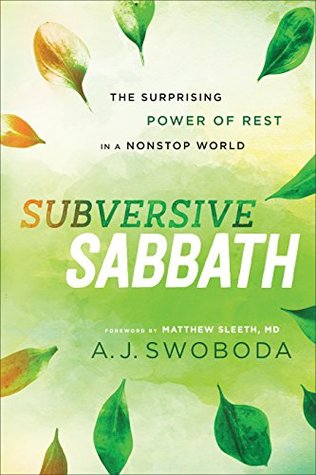More on this book
Community
Kindle Notes & Highlights
by
A.J. Swoboda
Read between
January 16 - May 31, 2021
The root sin of busyness is sloth—that laziness of spirit in which the muscles of intention of discernment and boundary have atrophied. In sloth, we refuse to do “what we are created to do as beings made in the image of God and saved by the Cross of Christ.”5 Sloth of spirit is the inability to say no and have boundaries.
Except for laziness, a no actually comes from a place of self-knowledge, of self-restraint, of self-awareness. For the Christian, a no should be spoken with the discernment of what God has spoken yes over. We must be sensitive to what God has called us to in order to be free to say no to other prospects.
The life of Jesus, it turns out, brings full circle the Sabbath rest of God in creation. God rested on the seventh day when he created the world. Likewise, Jesus, as he re-created the world through his death and resurrection, rested on the seventh day—Holy Saturday. There, in a holy, borrowed grave, Jesus rested as his Father did at creation. Sabbath is, indeed, a little death, a secret station of the cross forgotten by culture and the church.
As the Lord healed on the Sabbath in the Gospels, the gospel frees us to be healed by the Lord of the Sabbath. Sabbath brings about a new rhythm that is largely out of sync with the rhythms all around us. That is a good thing. The life of a Christian is not to be conformed to the patterns and timelines of the world.
In the Bible, shalom means universal flourishing, wholeness and delight—a rich state of affairs in which natural needs are satisfied and natural gifts fruitfully employed, a state of affairs that inspires joyful wonder as its Creator and Savior opens doors and welcomes the creatures in whom he delights.”12 That shalom, however, was destroyed by human sinfulness and dominance over creation.
The fact that one is exhausted when overworking eighty hours a week and never keeping a Sabbath is not a prayer issue; it is an obedience issue. We should not pray for God to do what we are supposed to do. The problem remains that we are not entering into the thing, Sabbath, that very well could begin to repair our lives.
This is why, throughout Jewish and Christian history, the Sabbath has been conceived as a day for miracles and healing. In Exodus 16:17–18, for example, the Israelites experience the manna miracle on the Sabbath day. We see the connection between Sabbath and shalom in the Gospels when Jesus heals a man on the Sabbath. Jesus asks, “Why are you angry with me for healing a man’s whole body on the Sabbath?” (John 7:23). Sabbath is about wholeness. Those in the temple courts might have forgotten this, but Jesus certainly had not.
As Gregory of Nyssa once wrote, “Would the Lord really command us to do something that is beyond our nature and issue a commandment whose enormity oversteps our human capacity? That is not possible. He would not order naturally wingless creatures to become birds, or creatures fitted for life on dry land to live under water.”22 God made us to work and rest.
This phenomenon is something mental health practitioners call “anticipatory brain”—when one’s brain anticipates something because it has been trained to prepare for it. The psychological difference is astounding. My brain, body, and spirit have come to trust that a day of rest is coming. God gave us brains and minds to use to his glory. But to never give our minds a day to rest will have long-term implications.
So much of our work is mind work. Most of our tiredness is mental exhaustion. Our brains need a Sabbath, especially from a content-driven culture in which we are bombarded with more ideas and information than at any other time in human history. Because of this, we are drowning in a deluge of information yet craving the cool waters of transformation. The words of Abraham Heschel ring true: “The higher goal of spiritual living is not to amass a wealth of information, but to face sacred moments.”29
Juan-Carlos Lerman, a researcher at the University of Arizona, examined the relationship between our physical work and rest. What Lerman’s scientific research demonstrated was that the average human being needs one day of rest per seven days to function properly. Lerman’s research is summarized by Marva Dawn: “According to Lerman’s theory, failing to rest after six days of steady work will lead to insomnia or sleepiness, hormonal imbalances, fatigue, irritability, organ stress, and other increasingly serious physical and mental symptoms.”32
Compulsivity is what happens when our impulses and actions become one—when there is no discernment about what we should or should not act on. Compulsivity is looking at the news two hundred times a day, sending texts with every thought, and getting work done whenever and wherever we are. But the Sabbath puts an end to that emotional crisis of compulsivity by protecting us from being enslaved to our instincts and impulses.
Our madly rushing, neurotic society needs the therapy of the silence and quietness that flows from a day kept holy, really holy. A day when our thoughts are of God, our actions are tempered by a desire to serve God and our families, a day that is so different from other days that it could make us different in our relationship to God and to our fellow men. Ernest R. Palen, in Herbert E. Saunders, The Sabbath


